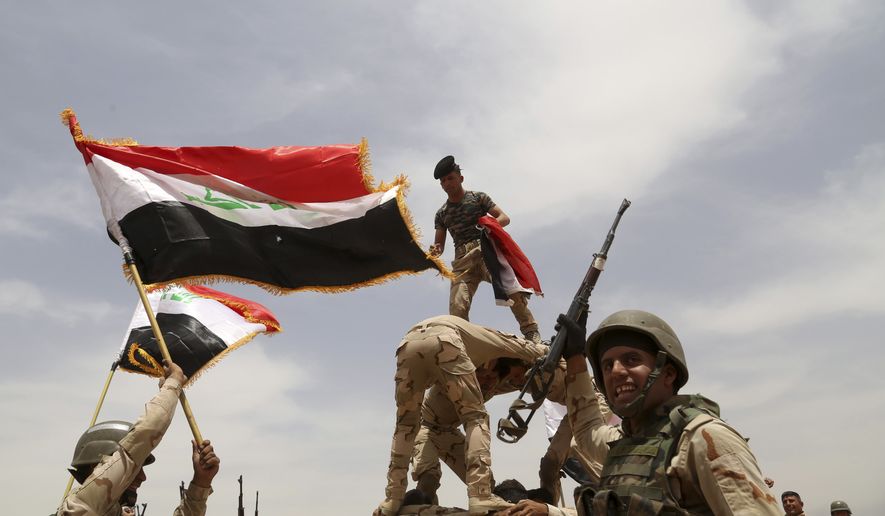Defense Secretary Ashton Carter told lawmakers Wednesday that U.S. training of Iraqi forces is moving too slowly and Iraqi forces are hampered by “disunity, deserters, and so-called ’ghost solders.’”
He said those difficulties don’t change the fact that local ground troops — not U.S. boots on the ground — are needed to defeat the Islamic State, also known as ISIS and ISIL.
Mr. Carter, who previously questioned Iraqi forces’ will to fight after they abandoned their weapons and fled Ramadi amid a string of car bomb attacks, said some progress is being made but that many problems remain unsolved.
“The combination of disunity, deserters, and so-called ’ghost soldiers’ — who are paid on the books but don’t show up or don’t exist — has greatly diminished their capacity,” Mr. Carter told members of Congress at a House Armed Services Committee hearing.
Mr. Carter acknowledged that the Pentagon is lagging behind in its mission to prepare Iraqis for war because the country is unable to recruit enough fighters to train. The U.S. had hoped to train 24,000 Iraqis by the fall, yet U.S. trainers have only trained about 7,000 Iraqis, Mr. Carter said.
“Our training efforts in Iraq have thus far been slowed by a lack of trainees — we simply haven’t received enough recruits,” Mr. Carter said.
The Pentagon said last week that the Iraq government is having difficulty recruiting soldiers, both because of budget issues and because it is struggling to get people to join the fight against the Islamic State. Recruiting is so low that some U.S. trainers are in Iraq with no one to train.
The Iraqi Security Forces suffered a serious setback last year when four divisions dissolved as Mosul fell into Islamic State hands. Iraqi fighters have continued to struggle, including most recently the fall of Ramadi, where Chairman of the Joint Chiefs Gen. Martin Dempsey previously said they weren’t driven out of the city — instead “they drove out.”
Despite those difficulties, military leaders said that past experience shows that it must be local forces, not U.S. troops, that secure the country to keep long-term stability.
“Could we go in and do a better job ourselves against ISIL? Absolutely. But we’ll be back in there two years from now,” Gen. Dempsey said.
President Obama announced last week that he would send an additional 450 U.S. advisers to al Taqaddum air base in al Anbar province, between the Islamic State-held cities of Ramadi and Fallujah. The additional U.S. troops are providing advice and assistance to Iraqi leaders in the fight in Anbar as well as coordinating with Sunni tribes to bring them into the U.S. training pipeline.
Rep. Mac Thornberry, Texas Republican and chair of the House Armed Services Committee, questioned how such a small number could make any difference in the broader fight against the Islamic State, especially given the complicated security situation and problems with local forces.
“I know of no one who thinks that 450 more in Iraq under current constraints will turn the tide against ISIS,” he said.
But Mr. Carter said those 450 new troops are already making progress, recruiting Sunni fighters to go through the training and told lawmakers they could expect to see visible results in a matter of “weeks.”
When asked by a lawmaker if the U.S. was “winning” in the fight against the Islamic State, Gen. Dempsey cautioned that its the Iraqis’ fight to win, not the United States’. When pressed, however, on the status of the U.S. fight, Gen. Dempsey said America is where it is on its way to providing Iraqis the training they were promised.
“We are on the path to deliver that which we’ve committed to delivering which is security forces, not just [Iraqi Security Forces] but Peshmerga and Sunni tribes,” he said. “We are on the path to deliver to them the capability to combat ISIL in their sovereign territory.”
Mr. Carter said that a victory in the fight would not be destroying every Islamic State terrorist. Instead, winning is defined for him as eliminating any safe haven where terrorists could gather and plan attacks.
“Success in this campaign would be not eliminating every mole … but every mole hole,” he said.
• Jacqueline Klimas can be reached at jklimas@washingtontimes.com.




Please read our comment policy before commenting.